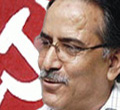
With the resignation of the Prime Minister of Nepal Pushpa Kamal Dahal, better known as Prachanda, over the sacking of Army chief, the newly formed democratic government is again tangled in political disarray as the Communist Party of Nepal (Unified Marxist-Leninist) (CPN-UML), the second-largest party in the coalition withdrew its support.
Difference between the political parties even the partners in the ruling alliance with the Maoists has resurfaced amid lack of consensus in a democratic set up and the prolongation of authoritarian approach by the Maoists-led government.
Prachanda’s unilateral move to dismiss Gen. Rookmangud Katawal, who refused to include Maoists rebels in the army, was taken as unconstitutional by the President Ram Baran Yadav who soon overruled Maoist government’s ruling.
The Maoists, however, considered it as a constitutional coup by the President and vowed to fight against the move. But in reality, it is the one point stand by Prachanda without the accord of all in the government, which led to the crisis that might go a long way from here.
Nepal prime minister’s action can also be questioned as government allies—the CPN (UML), the CPN (Unified) and the Sadbhavana Party—walked out of the Cabinet meeting at the proposed sacking. In addition, another ally Madhesi Janadhikar Forum too submitted its dissent. Aversion on the ruling to such an extent was bound to sow seeds of political uncertainty in the days to come.
As political crisis is taking its charge in Nepal, neighbouring country India in reply to Prachanda’s comment, which indirectly blamed India of playing a card in the present crisis, immediately responded by saying that it was only Nepal’s ‘internal matter’.
India called for a broad political consensus among the political parties in Nepal to end the crisis. Considering the long border, close cultural and economic ties, moreover, to counter the influence of China; India has certainly an important role to play in facilitating stability in Nepal. But then, the Maoists too need to recognize the roots of a successful democracy that lies in the ‘will of the people’ and not mere the ‘goals of a certain section’.
Nepal formed its first-ever democratic government after conducting Constituent Assembly elections last May in which Maoists emerged victorious. The nation abolished its 240-year-old monarchy and declared itself a republic. But the new conflict has again pushed the state to the old block with doubt over the peace deal and the proposed drafting of the constitution.
|
|


Comments: